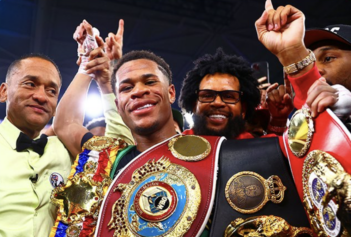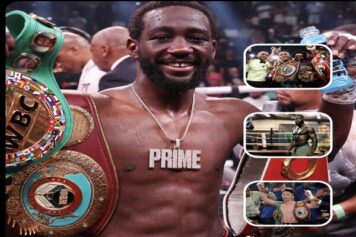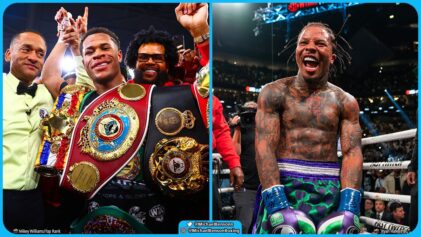Culture has converged directly into the lanes of sports and entertainment.
Take the now-infamous Dipset vs. The Lox “Verzuz” battle at New York City’s hallowed Madison Square Garden Theatre, where a boxing match preceded the hip-hop celebration.
Bad Habits Turned Intersectional Confusion
However, the bad habits of the culture, including the racially derogatory N-word, have been co-opted as terms of endearment. The word has been used heavily by those of other cultures that are considered Black-adjacent.
However, is it right, or do we have to understand that with intersectionality comes confusion to those outside the intersection?
Take the recent confrontation between lightweight boxing stars Devin Haney and Teofimo Lopez. During the heated exchange, the two fighters and their respective trainer fathers stood toe-to-toe at the Mikey Garcia vs. Sandor Martin event, hurling expletives at each other.
Although no blows were thrown, Lopez comfortably used the N-word profusely at Haney during the exchange. With the media in full force and camera phones surrounding the viral moment, the plethora of alarm at Lopez, a Honduran-American born in Brooklyn, New York, usage of the word abounded.
The Color Barrier
Haney is an African-American man from Oakland, California, who took no offense at the word itself, just at Lopez’s assumed position of boxing superiority in the argument.
That’s because the two subscribe to street culture rules which have now bled into the popular culture stream of consciousness. Much like rap music is the ear to the street providing a raw and uncut report in an active voice, so now are sports like boxing.
However, street culture adherents like Teofimo Lopez step out comfortably on the N-word with Black people create mental difficulty. Mainly, this is due to the conflation of colorism in the message.
Teofimo Lopez is a lighter-skinned Honduran. That fact goes over no one’s head, and it is abhorrent and even cancelable in the case of culture voyeurs who are not adherents.
Conversely, during the news conference for the upcoming fight between Gervonta “Tank” Davis and Rolando “Rolly” Romero, Davis used the N-Word against Romero.
Romero is a lighter skinned Cuban-American fighting out of Las Vegas. Davis is African-American from Baltimore.
Hip-Hop Started It?
However, it should be noted that many Black people do not find this offensive. For years in the rap world, Fat Joe, a Puerto Rican-American from the South Bronx, has proudly used the N-word.
He has the ultimate hood pass, making Black stars like Remy Ma while being a star himself, and he is perceived as an OG in hip-hop. The designation is rightfully earned, but once his former Diggin’ In The Crates Crew classic boom-bap sound crossed into the Bad Boy style hip-pop cultural rap remake, his choice of simple words became a hot topic of contention.
Fallen Angel
A boxing reality check was served to Angel Garcia, father of Danny “Swift” Garcia, a former multiple weight class world champion during his lead-up to fight Keith Thurman in 2017.
During a press conference, the elder Garcia referred to Thurman as the N-word after Thurman labeled his son a “cherry-picker” of easy opponents. The result was a badge of shame for Garcia and an excoriation of his racial insensitivity.
After all, the fight and all press events were broadcast through Showtime networks, which cannot afford to seem racially insensitive to the massive network of subscribers.
But Garcia didn’t understand the backlash. Coming from the North Philly section of Philadelphia, he is immersed in a Black and Brown world where the N-word is said as casually as eating a cheesesteak.
The Reality
Still, with the addition of white gaze and pop culture morality, should Black athletes and entertainers establish a boundary? Should usage of the N-word be exclusively for African-Americans?
It brings into account colorism even more. In reality, the culture’s blurred lines can be perceived as a double standard by everyone else non-Black and Latinx.



